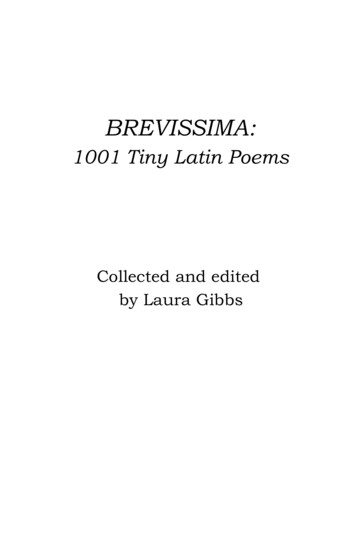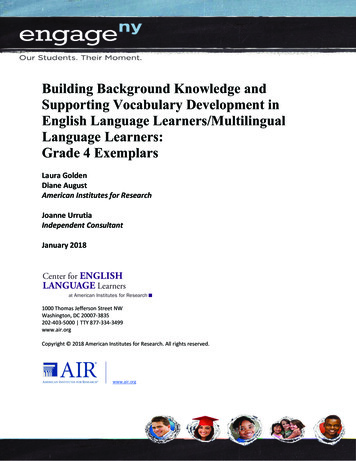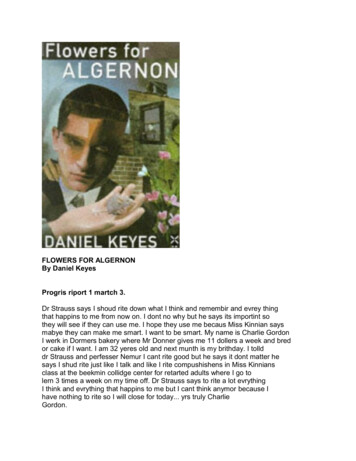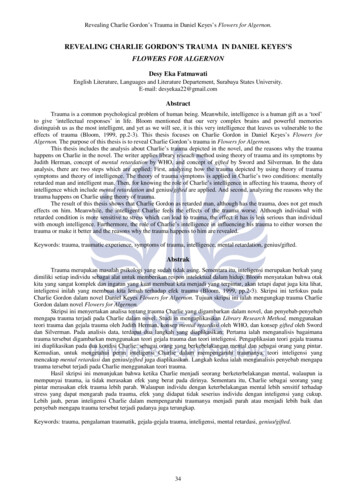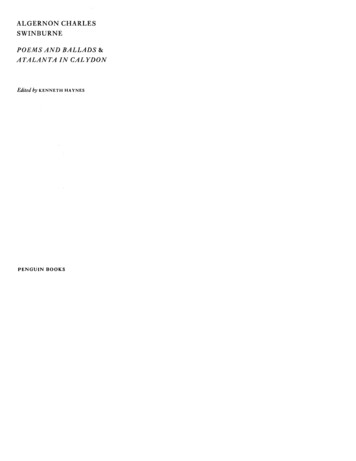
Transcription
ALGERNONCHARLESSWINBURNEPOEMS AND BALLADSATALANTAEdited byIN CALYDONKENNETHPENGUIN&BOOKSHA YNES
PENGUINPublishedBOOKSby the Penguin GroupPenguin Books Ltd, '7 Wrights Lane, London w8 5TZ, EnglandPenguin Putnam Inc., 375 Hudson Street, New York, New York tool4, USAPenguin Books AuslrdiaLtd, Ringwood,Victoria, AusmiliaBooks Canada Ltd, 10 Alcorn Avenue, Toronto, Ontario, Canada M4v ]B2Penguin Books India (P) Ltd, II, Community Centre, Panchsheel Park, New Delhi - 110017, IndiaPenguinPenguin Books (NZ) Ltd, Private Bag 102 )0', NSMC,Penguin Books (South Africa)(Pty)Penguin Books Ltd, RegisteredOffices: Hannondsworth,POtftlS.nd B.llads first publishedAt.lo.t.PublishedAuckland, New ZealandLtd, 5 Watkins Street, Denver Ext 4.JobannesburgMiddlesex,England1866i. C./ydoN first published1865together in Penguin ClassicsSelection, Preface and Notes copyright20000 Kenneth Haynes,2000AU rights reservedThe moral right of the editor has been assertedSet in 10/II.5pt PostScriptMonotypeEhrhardtTypesetby Rowland PhototypesettingLtd, Bury St Edmunds,Printedin England by Clays Ltd, St Ives plcSuffolkStates of America, this book is sold subjectthat it shall not, by way of trade or otherwise, be Jem,re-sold, hired out, or otherwise circulated without the publisher'sprior consent in any fonn ofbinding or cover other than that inwhich it is published and without similar condition incJuding thisExcept in the Unitedtothe conditionOJ.conditionbeing imposed on the subsequentpurchaser20 )4,South Africa
47ANACTORIAo swallow, sister, 050rapid swallow,I pray thee sing not a little space.Are not the roofs and the lintels wet?The woven web that was plain to follow,The small slain body, the flowerlike face,Can I remember if thou forget?o sister,60sister, thy first-begotten!The hands that cling and the feet that follow,The voice of the child's blood crying yetWho hath remembered me? who hath forgotten?Thou hast forgotten, 0 summer swallow,But the world shall end when I forget.Anactoria't[vo lUX'!'av 'til(JaYllvEu(Ja 3tEL8oi: j LA.6'ta'ta;SAPPHO.10My life is bitter with thy love; thine eyesBlind me, thy tresses bum me, thy sharp sighsDivide my flesh and spirit with soft sound,And my blood strengthens, and my veins abound.I pray thee sigh not, speak not, draw not breath;Let life bum down, and dream it is not death.I would the sea had hidden us, the fire(Wilt thou fear that, and fear not my desire?)Severed the bones that bleach, the flesh that cleaves,And let our sifted ashes drop like leaves.I feel thy blood against my blood: my painPains thee, and lips bruise lips, and vein stings vein.Let fruit be crushed on fruit, let flower on flower,Breast kindle breast, and either bum one hour.Why wilt thou follow lesser loves? are thineToo weak to bear these hands and lips of mine?
4820304050POEMSAND BALLADSI charge thee for my life's sake, 0 too sweetTo crush love with thy cruel faultless feet,I charge thee keep thy lips from hers or his,Sweetest, till theirs be sweeter than my kiss:Lest I too lure, a swallow for a dove,Erotion or Erinna to my love.I would my love could kill thee; I am satiatedWith seeing thee live, and fain would have thee dead.I would earth had thy body as fruit to eat,And no mouth but some serpent's found thee sweet.I would find grievous ways to have thee slain,Intense device, and superflux of pain;Vex thee with amorous agonies, and shakeLife at thy lips, and leave it there to ache;Strain out thy soul with pangs too soft to kill,Intolerable interludes, and infinite ill;Relapse and reluetation of the breath,Dumb tunes and shuddering semitones of death.I am weary of all thy words and soft strange ways,Of all love's fiery nights and all his days,And all the broken kisses salt as brineThat shuddering lips make moist with waterish wine,And eyes the bluer for all those hidden hoursThat pleasure fills with tears and feeds from flowers,Fierce at the heart with fire that half comes through,But all the flowerlike white stained round with blue;The fervent underlid, and that aboveLifted with laughter or abashed with love;Thine amorous girdle, full of thee and fair,And leavings of the lilies in thine hair.Yea, all sweet words of thine and all thy ways,And all the fruit of nights and flower of days,And stinging lips wherein the hot sweet brineThat Love was born of bums and foams like wine,And eyes insatiable of amorous hours,Fervent as fire and delicate as flowers,Coloured like night at heart, but cloven throughLike night with flame, dyed round like night with blue,
4960708090ANACTORIAClothed with deep eyelids under and above Yea, all thy beauty sickens me with love;Thy girdle empty of thee and now not fair,And ruinous lilies in thy languid hair.Ah, take no thought for Love's sake; shall this be,And she who loves thy lover not love thee?Sweet soul, sweet mouth of all that laughs and lives,Mine is she, very mine; and she forgives.For I beheld in sleep the light that isIn her high place in Paphos, heard the kissOf body and soul that mix with eager tearsAnd laughter stinging through the eyes and ears;Saw Love, as burning flame from crown to feet,Imperishable, upon her storied seat;Clear eyelids lifted toward the north and south,A mind of many colours, and a mouthOf many tunes and kisses; and she bowed,With all her subtle face laughing aloud,Bowed down upon me, saying, 'Who doth thee wrong,Sappho?' but thou - thy body is the song,Thy mouth the music; thou art more than I,Though my voice die not till the whole world die;Though men that hear it madden; though love weep, .Though nature change, though shame be charmed to sleep.Ah, wilt thou slay me lest I kiss thee dead?Yet the queen laughed from her sweet heart and said:'Even she that flies shall follow for thy sake,And she shall give thee gifts that would not take,Shall kiss that would not kiss thee' (yea, kiss me)'When thou wouldst not' - when I would not kiss thee!Ah, more to me than all men as thou art,Shall not my songs assuage her at the heart?Ah, sweet to me as life seems sweet to death,Why should her wrath fill thee with fearful breath?Nay, sweet, for is she God alone? hath sheMade earth and all the centuries of the sea,Taught the sun ways to travel, woven most fineThe moonbeams, shed the starbeams forth as wine,
50POEMS100no120130AND BALLADSBound with her myrtles, beaten with her rods,The young men and the maidens and the gods?Have we not lips to love with, eyes for tears,And summer and flower of women and of years?Stars for the foot of morning, and for noonSunlight, and exaltation of the moon;Waters that answer waters, fields that wearLilies, and languor of the Lesbian air?Beyond those flying feet of fluttered doves,Are there not other gods for other loves?Yea, though she scourge thee, sweetest, for my sake,Blossom not thorns and flowers not blood should break.Ah that my lips were tuneless lips, but pressedTo the bruised blossom of thy scourged white breast!Ah that my mouth for Muses' milk were fedOn the sweet blood thy sweet small wounds had bled!That with my tongue I felt them, and could tasteThe faint flakes from thy bosom to the waist!That I could drink thy veins as wine, and eatThy breasts like honey! that from face to feetThy body were abolished and consumed,And in my flesh thy very flesh entombed!Ah, ah, thy beauty! like a beast it bites,Stings like an adder, like an arrow smites.Ah sweet, and sweet again, and seven times sweet,The paces and the pauses of thy feet!Ah sweeter than all sleep or summer airThe fallen fillets fragrant from thine hair!Yea, though their alien kisses do me wrong,Sweeter thy lips than mine with all their song;Thy shoulders whiter than a fleece of white,And flower-sweet fingers, good to bruise or biteAs honeycomb of the inmost honey-eells,With almond-shaped and roseleaf-eoloured shellsAnd blood like purple blossom at the tipsQuivering; and pain made perfect in thy lipsFor my sake when I hurt thee; 0 that IDurst crush thee out of life with love, and die,
51140150160ANACTORIADie of thy pain and my delight, and beMixed with thy blood and molten into thee!Would I not plague thee dying overmuch?Would I not hurt thee perfectly? not touchThy pores of sense with torture, and make brightThine eyes with bloodlike tears and grievous light?Strike pang from pang as note is struck from note,Catch the sob's middle music in thy throat,Take thy limbs living, and new-mould with theseA lyre of many faultless agonies?Feed thee with fever and famine and fine drouth,With perfect pangs convulse thy perfect mouth,Make thy life shudder in thee and bum afresh,And wring thy very spirit through the flesh?Cruel? but love makes all that love him wellAs wise as heaven and crueller than hell.Me hath love made more bitter toward theeThan death toward man; but were I made as heWho hath made all things to break them one by one,If my feet trod upon the stars and sunAnd souls of men as his have alway trod,God knows I might be crueller than God.For who shall change with prayers or thanksgivingsThe mystery of the cruelty of things?Or say what God above all gods and yearsWith offering and blood-sacrifice of tears,With lamentation from strange lands, from gravesWhere the snake pastures, from scarred mouths of slaves,From prison, and from plunging prows of shipsThrough flamelike foam of the sea's closing lips With thwartings of strange signs, and wind-blown hairOf comets, desolating the dim air,When darkness is made fast with seals and bars,And fierce reluctance of disastrous stars,Eclipse, and sound of shaken hills, and wingsDarkening, and blind inexpiable things With sorrow of labouring moons, and altering lightAnd travail of the planets of the night,
S2170ISo11)0200POEMSANDBALLADSAnd weeping of the weary Pleiads seven,Feeds the mute melancholy lust of heaven?Is not his incense bitterness, his meatMurder? his hidden face and iron feetHath not man known, and felt them on their wayThreaten and trample all things and every day?Hath he not sent us hunger? who hath cursedSpirit and flesh with longing? filled with thirstTheir lips who cried unto him? who bade exceedThe fervid will, fall short the feeble deed,Bade sink the spirit and the flesh aspire,Pain animate the dust of dead desire,And life yield up her flower to violent fate?Him would I reach, him smite, him desecrate,Pierce the cold lips of God with human breath,And mix his immortality with death.Why hath he made us? what had all we doneThat we should live and loathe the sterile sun,And with the moon wax paler as she wanes,And pulse by pulse feel time grow through our veins?Thee too the years shall cover; thou shalt beAs the rose born of one same blood with thee,As a song sung, as a word said, and fallFlower-wise, and be not any more at all,Nor any memory of thee anywhere;For never Muse has bound above thine hairThe high Pierian flower whose graft outgrowsAll summer kinship of the mortal roseAnd colour of deciduous days, nor shedReflex and flush of heaven about thine head,Nor reddened brows made pale by floral griefWith splendid shadow from that lordlier leaf.Yea, thou shalt be forgotten like spilt wine,Except these kisses of my lips on thineBrand them with immortality; but me Men shall not see bright fire nor hear the sea,Nor mix their hearts with music, nor beholdCast forth of heaven, with feet of awful gold
53210220230240ANACTORIAAnd plumeless wings that make the bright air blind,Lightning, with thunder for a hound behindHunting through fields unfurrowed and unsown,But in the light and laughter, in the moanAnd music, and in grasp of lip and handAnd shudder of water that makes felt on landThe immeasurable tremor of all the sea,Memories shall mix and metaphors of me.Like me shall be the shuddering calm of night,When all the winds of the world for pure delight.Close lips that quiver and fold up wings that ache;When nightingales are louder for love's sake,. And leaves tremble like lute-strings or like fire;Like me the one star swooning with desireEven at the cold lips of the sleepless moon,As I at thine; like me the waste white noon,Burnt through with barren sunlight; and like meThe land-stream and the tide-stream in the sea.I am sick with time as these with ebb and flow,And by the yearning in my veins I knowThe yearning sound of waters; and mine eyesBurn as that beamless fire which fills the skiesWith troubled stars and travailing things of flame;And in my heart the grief consuming themLabours, and in my veins the thirst of these,And all the summer travail of the treesAnd all the winter sickness; and the earth,Filled full with deadly works of death and birth,Sore spent with hungry lusts of birth and death,Has pain like mine in her divided breath;Her spring ofleaves is barren, and her fruitAshes; her boughs are burdened, and her rootFibrous and gnarled with poison; underneathSerpents have gnawn it through with tortuous teethMade sharp upon the bones of all the dead,And wild birds rend her branches overhead.These, woven as raiment for his word and thought,These hath God made, and me as these, and wrought
S4250260270280POEMSAND BALLADSSong, and hath lit it at my lips; and meEarth shall not gather though she feed on thee.As a shed tear shalt thou be shed; but I Lo, earth may labour, men live long and die,Years change and stars, and the high God deviseNew things, and old things wane before his eyesWho wields and wrecks them, being more strong thantheyBut, having made me, me he shall not slay.Nor slay nor satiate, like those herds of hisWho laugh and live a little, and their kissContents them, and their loves are swift and sweet,And sure death grasps and gains them with slow feet,Love they or hate they, strive or bow their knees And all these end; he hath his will of these.Yea, but albeit he slay me, hating me Albeit he hide me in the deep dear seaAnd cover me with cool wan foam, and easeThis soul of mine as any soul of these,And give me water and great sweet waves, and makeThe very sea's name lordlier for my sake,The whole sea sweeter - albeit I die indeedAnd hide myself and sleep and no man heed,Of me the high God hath not all his will.Blossom of branches, and on each high hillClean air and wind, and under in clamorous valesFierce noises of the fiery nightingales,Buds burning in the sudden spring like fire,The wan washed sand and the waves' vain desire,Sails seen like blown white flowers at sea, and wordsThat bring tears swiftest, and long notes of birdsViolently singing till the whole world sings I Sappho shall be one with all these things,With all high things for ever; and my faceSeen once, my songs once heard in a strange place,Cleave to men's lives, and waste the days thereofWith gladness and much sadness and long love.Yea, they shall say, earth's womb has borne in vainNew things, and never this best thing again;
55290300HYMNTO PROSERPINEBorne days and men, borne fruits and wars and wine,Seasons and songs, but no song more like mine.And they shall know me as ye who have known me here,Last year when I loved Atthis, and this yearWhen I love thee; and they shall praise me, and say'She hath all time as all we have our day,Shall she not live and have her will' - even I?Yea, though thou diest, I say I shall not die.For these shall give me of their souls, shall giveLife, and the days and loves wherewith I live,Shall quicken me with loving, fill with breath,Save me and serve me, strive for me with death.Alas, that neither moon nor snow nor dewNor all cold things can purge me wholly through,Assuage me nor allay me nor appease,Till supreme sleep shall bring me bloodless ease;Till time wax faint in all his periods;Till fate undo the bondage of the gods,And lay, to slake and satiate me all through,Lotus and Lethe on my lips like dew,And shed around and over and under meThick darkness and the insuperable sea.Hymn to Proserpine(AFTER THE PROCLAMATIONCHRISTIANIN ROME OF THEFAITH)V;c;st;, Galilcee.I have lived long enough, having seen one thing, that lovehath an end;Goddess and maiden and queen, be near me now andbefriend.Thou art more than the day or the morrow, the seasons thatlaugh or that weep;For these give joy and sorrow; but thou, Proserpina, sleep.Sweet is the treading of wine, and sweet the feet of the dove;
332NOTES TO PP. 45-55ItylusThe poem is a monologue by Philomela, the sister of Procne, who is thewife ofTereus, the king ofThrace (line 48). He lusts after Philomela, rapesher, and then cuts off her tongue and hides her. Philomela tells her storyby weaving the events in the design of a tapestry (line 52), which she sendsto Procne. The sisters revenge themselves by killing Itylus, the son ofTereus and Procne, and cooking him. Procne feeds him to Tereus andafterwards reveals what they have done; Tereus pursues them in a rage,but they are saved by the gods, who tum Philomela into a nightingale (line19) and Procne into a swallow.In Daulis (line 48), in central Greece, the women murdered Itylus,according to Thucydides (ii. 29). Swinburne appears to locate it on theThracian coast, perhaps mistaking a detail from Matthew Arnold's 'Philomela' (1853). The wet roofs and lintels (line 51) may suggest the blood ofItylus; cf. Ovid's Metamorphoses, Book 6, line 646 ('manant penetralia tabo','the room drips with gore'). 'Itylus' is the name in Homer; 'Itys' is morecommon. In Greek poetry, it is Procne who becomes the nightingale.Ovid's Metamorphoses, Book 6, is the major source of the story. Thereare references to it in Homer (Odyssey, Book 19, lines 518-523), Aeschylus(Agamemnon, lines 1140-9 and Suppliants, lines 58-67), and Apollodorus.In addition to Matthew Arnold, Catulle Mendes was inspired by the legend;see 'Le Rossignol' in Philomela (1863), which appeared shortly beforeSwinburne wrote his poem.Swinburne combines iambs and anapests in stanzas of six tetrametersrhyming abcabc. 'Swallow' is a constant feminine rhyme in each stanza.AnactoriaSwinburne's admiration for Sappho was unbounded. In a posthumouslypublished appreciation ('Sappho', The Saturday Review, 21 February 1914,p. 228) he wrote:Judging even from the mutilated fragments fallen within our reach from the brokenaltar of her sacrifice of song, I for one have always agreed with all Grecian traditionin thinking Sappho to be beyond aU question and comparison the very greatest poetthat ever lived.lEschylus is the greatest poet who ever was also a prophet; Shakespeareis the greatest dramatist who ever was also a poet; but Sappho is simply nothing less- as she is certainly nothing more - than the greatest poet who ever was at all. Suchat least is the simple and sincere profession of my lifelong faith.
.i33NOTES TO PP.47-55(See also Lang, 4, 124 and Swinburne's defence of the poem in 'Notes onPoems and Reviews', Appendix I.)Her ode beginning 'lputve'tut IJOL', known to Swinburne as the 'Odeto Anactoria', provides the context of this poem: Sappho suffers intenseerotic jealousy because of Anactoria's infidelity to her. In Swinburne'sdramatic monologue, Sappho addresses Anactoria in an attempt to win herback. He works some of Sappho's own words into the address. (Thestandard text of Sappho at the time was Theodor Bergk's Poetae LyriciGraeci, revised in 1853; citations to Bergk's edition are accompanied bythose to the Loeb text, edited and translated by David A. Campbell, GreekLyric, volume I.)line 63: 'For I beheld in sleep'; cf. 'In a dream I spoke with the Cyprus-born'(Bergk 86; Campbell 134).line 70: 'a mind of many colours'; translates JtOL'll.v.OIpQov, found in thefirst line of some texts of the Aphrodite ode.lines 73-4: 'Who doth thee wrong, Sappho?' translates lines 19-20 of theAphrodite ode.lines 81-4 are a translation of the sixth stanza of the Aphrodite ode.lines 189-200 are an expansion of Bergk 68, Campbell 55.line 221: 'sleepless moon' conflates the moon and the sleepless speaker ofone of the most famous fragments, though now denied by many toSappho; Bergk 52, Campbell 168B.In addition, Sappho's boasts that she will be remembered after deathhave been amplified in lines 203-14. The names Erinna (line 22) and Atthis(line 286) occur in some fragments. The name 'Erotion' (line 22) presumablyrefers to a male lover; see the note to Swinburne's poem 'Erotion'. Lines260-5 allude to the legend of Sappho's suicide by drowning as the resultof an unhappy love affair with Phaon.The epigraph is an emendation, perhaps Swinburne's own, of a corruptline in the Aphrodite ode; Swinburne's version means 'Whose love haveyou caught in vain by persuasion?' (Sappho calls Persuasion the daughterof Aphrodite; see Bergk 133, Campbell 200.)'Reluctation' (line 33) means 'struggle, resistance, opposition' (OED:'somewhat rare'; 'obsolete' with reference to bodily organs). Aphrodite's'amorous girdle' (line 45) makes her irresistible; in lines 49-50, we aregiven the account of her birth from the ocean (Aphrodite Anadyomene);Paphos, line 64, is the site of her famous sanctuary on Cyprus. 'Storied'(line 68) means either 'ornamented with scenes from history or legend' or'celebrated in history or story'. 'Flies' (line 81) means 'flees'. Swinburneactivates the etymology of'disastrous' in 'disastrous stars' (line 164); 'comet'and 'hair' (lines 161-2) are also connected etymologically. Pieria is a districtin Thessaly associated with the Muses, and so the 'high Pierian flower'(line 195) is a poem as well as the garland for the victorious poet. 'Reflex'
334NOTESTO PP.47-61(line 198) is a reflection of light. In line 3 2, the lotus produces dreamyforgetfulness, and Lethe is the river of oblivion.Timothy A. ]. Burnett, in 'Swinburne at Work: The First Page of"Anactoria'" (in The Whole Music of Passion, eds Rikky Rooksby andNicholas Shrimpton, 1993), discusses and reproduces a draft of the firstpage of the poem. It is also reproduced in Yopie Prins, Victorian Sappho(1999), p, 118. Edmund Gosse discusses a first version of the poem in 'TheFirst Draft of Swinburne's "Anactoria'" (Modern Language Review, 14,1919, pp. 271-7).The poem is in heroic couplets; all sentences come to a stop at the endofa line.Hymn to ProserpineConstantine I, the first Christian Roman emperor, issued the Edict of Milanin 313 with the Eastern Roman emperor Licinus; it established religioustoleration of Christians and protected their legal rights. Constantine's policywent further than official toleration, and he began to establish Rome as aChristian state. His nephew Julian (emperor from 361 to 363) announcedhis conversion to paganism in 361 and hence is known asJulian the Apostate(see L. M. Findlay, 'The Art of Apostasy', Victorian Poetry 28:1, Spring1990, pp. 69-78, for the Victorian controversies over 'national apostasy'and the image of Julian). He became a fierce opponent of Christians, buthis opposition had no lasting effect; his legendary dying words ('Vicisti,Galilaee', 'Thou hast conquered, Galilean') were reported in Greek byTheodoret, the Bishop of Cyrrhus, in the fifth century.Proserpine, or Persephone, is the wife of Hades and the queen (lines 2,92) of the underworld; the river Lethe (line 36) and poppies (line 97) areassociated with the oblivion of death. She is also Kore, a maiden (lines 2,92) and the daughter of Demeter, the earth (line 93). She and Demeter arethe subject of the mysteries at Eleusis. Swinburne contrasts the new queenof heaven (line 76), the Jewish (line 85, 'slave among slaves') virgin (lines75, 8I) mother of Christ, with Venus, the former queen. Venus is describedas she rose from the sea (lines 78, 86-9); she is the 'mother of Rome' (line80) both as Aeneas's mother and as Venus Genetrix; and she is calledCytherean (line 73) after her birthplace in Cythera.'I have lived long enough' (line I) quotes Macbeth's line from Act V,Scene 3, line 22. 'Galilean' (lines 23, 35, 74) is 'used by pagans as acontemptuous designation for Christ' (OED). In Greek 'unspeakablethings' (line 52, liQQTJta) can refer to the Eleusinian mysteries. L. M.Findlay (Swinburne, Selected Poems, 1982, pp. 257-8) suggests that thedescription of the wave of the world (line 54) is indebted to Turner's
40 That pleasure fills with tears and feeds from flowers, Fierce at the heart with fire that half comes through, But all the flowerlike white stained round with blue; The fervent underlid, and that above Lifted with laughter or abashed with love; Thine amorous girdle, full of thee and fair, And leavings of the lilies in thine hair.

